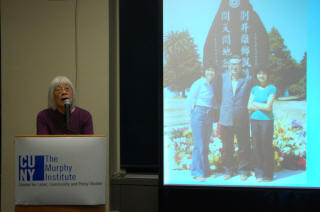
In the early twentieth century, most Chinese immigrants coming to the United States were detained at the Angel Island Immigration Station in San Francisco Bay. There, they were subject to physical exams, interrogations, and long detentions aimed at upholding the exclusion laws that kept Chinese out of the country. Many detainees recorded their anger and frustrations, hopes and despair in poetry written and carved on the barrack walls.
Island tells these immigrants’ stories while underscoring their relevance to contemporary immigration issues. First published in 1980, this book has been updated and expanded to include a new historical introduction, 150 poems in Chinese and English translation (including poems from Ellis Island and Victoria Island), extensive profiles of immigrants gleaned through oral histories, and dozens of new photographs from public archives and family albums.

An important historical document as well as a significant work of literature, Island is a testament to the hardships Chinese immigrants endured on Angel Island, and to their perseverance and determination to make a new life in America.
“During the time they spent on the island, as little as a few days, as long as three years, [immigrants] carved and ink brushed their concerns onto the walls of their barracks. One hundred thirty-five calligraphic poems survived, first discovered by a federal park ranger after Angel Island was abandoned in 1940. Together with the interviews, the poems—angry, heroic, wrenchingly forlorn, despairing, provocative, resistant—convey as no second-hand or third-hand account could ever do, what it was like to be Chinese and to be on Angel Island.” –New York Times
Publisher: University of Washington Press, 2014.
Co-Sponsor
Mapping of Asian Americans in New York (MAANY)

